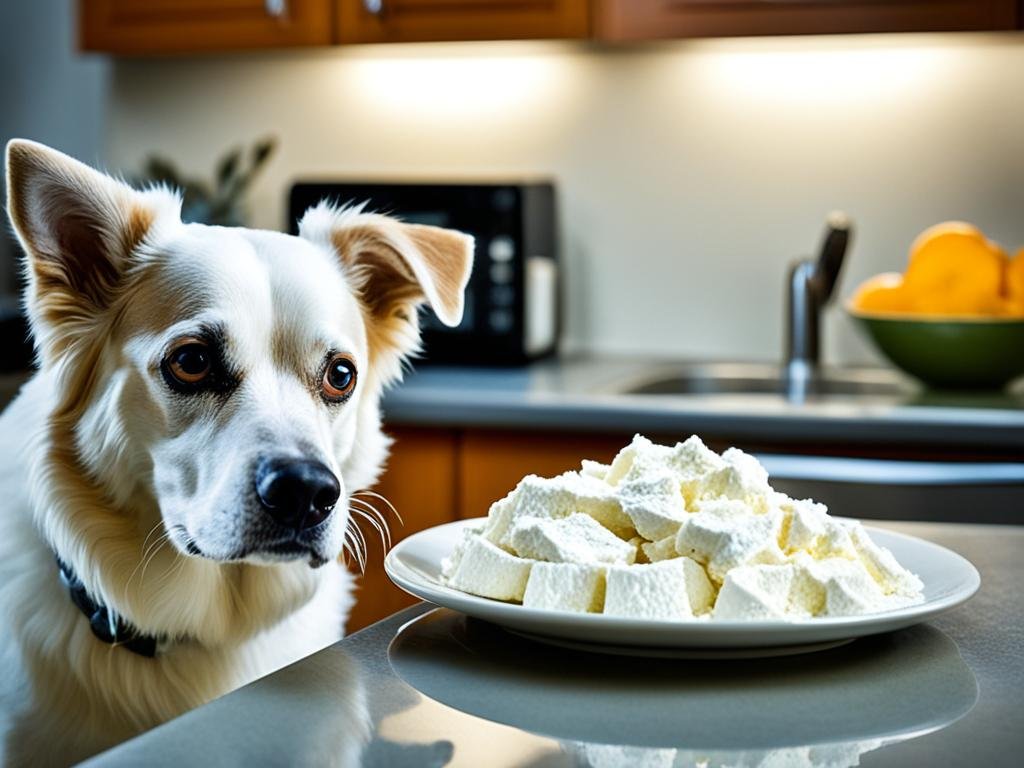Can Dogs Safely Eat Ricotta Cheese? A Complete Guide

Ricotta cheese, a beloved staple in Italian cuisine, embodies a creamy indulgence with a rich history and diverse culinary applications. Let’s delve into the essence of ricotta cheese, exploring its definition, composition, traditional uses, and the nuances of its production.
Ricotta , deriving its name from the Italian word “ricotta,” meaning “recooked,” stands out for its soft, delicate texture and subtle flavor. Unlike many other cheeses crafted from milk curds, ricotta is made from the whey leftover after cheese production. This whey undergoes a gentle heating process, causing the proteins to coagulate and form the creamy curds that define ricotta cheese.
In culinary traditions, ricotta cheese shines as a versatile ingredient, finding its way into an array of dishes. From classic Italian lasagna and stuffed pasta shells to savory dips and spreads, ricotta lends its creamy richness to both savory and sweet creations. Its mild flavor serves as a versatile canvas, complementing a wide range of ingredients and flavor profiles.
Despite its simplicity, the production of ricotta cheese boasts variations that contribute to its nuanced texture and taste. Traditional methods may involve different heating techniques, curd sizes, or even the addition of acid or rennet to aid in coagulation. These variations yield ricotta cheeses with unique characteristics, from silky smooth to slightly grainy textures, catering to diverse culinary preferences.
As we unravel the essence of ricotta cheese, we uncover not only its delightful taste and texture but also its cultural significance and culinary versatility. We also discuss that –Can dogs eat ricotta cheese? Whether enjoyed as a filling in pasta dishes, a topping on toast, or a decadent dessert ingredient, ricotta cheese adds a touch of creamy indulgence to every culinary creation.
Nutritional Value
Macronutrient Breakdown:
Protein: This cheese typically contains around 6-8 grams of protein per 100 grams serving. Protein is essential for muscle development, repair, and overall body function.
Fat: This cheese is moderately high in fat, with approximately 4-6 grams of fat per 100 grams serving. Fat provides energy, supports cell function, and aids in the absorption of fat-soluble vitamins.
Carbohydrates: It contains minimal carbohydrates, usually less than 3-5 grams per 100 grams serving. Carbohydrates serve as a source of energy but are not a significant component of ricotta cheese.
Micronutrients:
Calcium: This cheese is rich in calcium, providing approximately 140-180 milligrams per 100 grams serving. Calcium is essential for bone health, muscle function, and nerve transmission.
Phosphorus: It also contains phosphorus, another mineral important for bone formation, energy metabolism, and cellular function.
Vitamins:
Vitamin A: It contains vitamin A, which is important for vision, immune function, and skin health.
B Vitamins: Its a source of various B vitamins, including riboflavin (B2), niacin (B3), and vitamin B12, which play roles in energy metabolism, cell growth, and nervous system function.
Health Benefits of Ricotta Cheese for Dogs:

Protein Source: It provides a source of high-quality protein, which is essential for muscle development, repair, and overall health in dogs.
Calcium and Phosphorus: The calcium and phosphorus content in ricotta cheese supports bone health and strength, helping to prevent bone-related issues and promote overall skeletal health.
Vitamins and Minerals: It contains various vitamins and minerals that contribute to overall health and well-being in dogs, including vitamin A for vision and immune function, and B vitamins for energy metabolism and cellular function.
While ricotta cheese can offer nutritional benefits for dogs, it’s essential to feed it in moderation and as part of a balanced diet. Excessive consumption can lead to digestive upset, weight gain, or other health issues. Additionally, some dogs may be sensitive to dairy products, so it’s important to monitor for any signs of lactose intolerance or allergic reactions. Consulting with a veterinarian can help determine the appropriate amount of ricotta cheese to include in your dog’s diet based on their individual nutritional needs and health status.
Assessing the Safety for Dogs:
Overview of Potential Risks and Benefits of Ricotta Cheese:
Risks: This cheese poses several potential risks for dogs, including lactose intolerance, high fat content leading to pancreatitis or obesity, and elevated sodium levels that may be problematic for dogs with heart or kidney conditions.
Benefits: On the other hand, this cheese can provide nutritional benefits such as being a source of protein, calcium, and essential vitamins for dogs when fed in moderation.
Consideration of Individual Dog’s Dietary Needs and Health Status:
Before introducing ricotta cheese into a dog’s diet, it’s crucial to consider their individual dietary needs, health status, and any existing medical conditions.Dogs with lactose intolerance may experience digestive issues if fed ricotta cheese, while those prone to pancreatitis or obesity should consume it sparingly due to its high fat content.Dogs with heart or kidney conditions may need to avoid ricotta cheese altogether or choose low-sodium varieties to minimize the risk of complications.
Expert Opinions from Veterinarians and Canine Nutritionists:
Consulting with a veterinarian or canine nutritionist is recommended before incorporating ricotta cheese into a dog’s diet.These experts can provide personalized recommendations based on the dog’s age, breed, size, activity level, and overall health.Veterinarians and canine nutritionists can offer guidance on appropriate portion sizes, frequency of feeding, and alternative sources of nutrients if ricotta cheese is not suitable for the dog.
While ricotta cheese can offer some nutritional benefits for dogs, its safety should be carefully assessed based on individual dietary needs and health considerations. Consulting with experts such as veterinarians and canine nutritionists can help pet owners make informed decisions about whether ricotta cheese is suitable for their dog and how to incorporate it safely into their diet.
Potential Risks and Concerns Associated with Ricotta Cheese for Dogs:
Lactose Intolerance: Implications for Digestive Health:
Thischeese, like other dairy products, contains lactose, a sugar that some dogs may have difficulty digesting.
Dogs with lactose intolerance lack the enzyme lactase needed to break down lactose properly, leading to digestive issues such as diarrhea, gas, bloating, and abdominal discomfort.Feeding ricotta cheese to lactose-intolerant dogs can exacerbate these symptoms and cause discomfort or distress.
High Fat Content: Risk of Pancreatitis or Obesity:
Ricotta cheese is relatively high in fat, which can pose risks for dogs, especially those prone to pancreatitis or obesity.
Excessive fat intake can trigger inflammation of the pancreas, leading to pancreatitis—a painful and potentially life-threatening condition.Additionally, a diet high in fat can contribute to weight gain and obesity, increasing the risk of various health problems such as diabetes, joint issues, and heart disease.
Sodium Levels: Impact on Dogs with Heart or Kidney Conditions:
This cheese, like many dairy products, contains sodium, which can be harmful to dogs, particularly those with heart or kidney conditions.High sodium intake can lead to water retention, increased blood pressure, and strain on the heart and kidneys.
Dogs with heart disease or kidney problems may be more sensitive to elevated sodium levels and at higher risk of developing complications such as fluid buildup, hypertension, or kidney damage.
In summary, while ricotta cheese may be enjoyed by some dogs in moderation, it’s essential for pet owners to be aware of the potential risks associated with its consumption. Monitoring your dog for signs of lactose intolerance, pancreatitis, obesity, or other health issues after feeding ricotta cheese is crucial. Consulting with a veterinarian can help determine the appropriate amount of ricotta cheese to include in your dog’s diet based on their individual nutritional needs and health status.
Signs of Negative Reactions to Ricotta Cheese in Dogs:
Symptoms of Lactose Intolerance in Dogs:
Diarrhea: Loose stools or increased frequency of bowel movements may indicate difficulty digesting lactose present in ricotta cheese.
Gas: Excessive flatulence or bloating can occur as a result of fermentation of undigested lactose in the gut.
Abdominal Discomfort: Dogs may exhibit signs of abdominal pain or discomfort, such as whining, restlessness, or reluctance to move.
Allergic Reactions:
Itching: Allergic reactions to ricotta cheese or its components may manifest as itching, scratching, or excessive licking of the skin.
Swelling: Dogs may experience swelling of the face, lips, ears, or other body parts as a result of an allergic response to ricotta cheese.
Gastrointestinal Distress: Allergic reactions may also manifest as vomiting, diarrhea, or other digestive disturbances.
Behavioral Changes:
Discomfort: Dogs may display signs of discomfort or restlessness after consuming ricotta cheese, such as pacing, panting, or seeking out cool surfaces.
Lethargy: Some dogs may become lethargic, tired, or less active than usual if they experience discomfort or digestive upset after consuming ricotta cheese.
Changes in Appetite: Negative reactions to ricotta cheese can lead to changes in appetite, such as decreased food intake, reluctance to eat, or refusal of food altogether.
Monitoring your dog for signs of negative reactions to ricotta cheese is crucial for ensuring their well-being. If you observe any symptoms of lactose intolerance, allergic reactions, or behavioral changes after feeding ricotta cheese, it’s essential to discontinue its use and consult with a veterinarian for further evaluation and guidance. Your veterinarian can help identify the underlying cause of your dog’s symptoms and recommend appropriate dietary modifications or treatment options to address their specific needs.
Best Practices for Feeding Ricotta Cheese to Dogs:
Moderation:
Offer this cheese to your dog as an occasional treat rather than a regular part of their diet.Reserve ricotta cheese for special occasions or as a reward for good behavior to prevent overconsumption.
Portion Control:
Determine appropriate serving sizes based on your dog’s size, weight, and individual health status.
For small dogs, offer no more than 1 to 2 teaspoons of ricotta cheese per serving.
For medium dogs, limit ricotta cheese to 1 to 2 tablespoons per serving.
For large dogs, provide no more than 2 to 4 tablespoons of ricotta cheese at a time.
Adjust serving sizes as needed to prevent excessive calorie intake or digestive upset.
Alternatives:
Explore other nutritious treats and snacks for dogs to provide variety in their diet.Consider alternatives such as plain yogurt, cottage cheese, fruits, vegetables, or lean meats as healthier options.Choose treats that are low in fat, sodium, and added sugars to promote optimal health and well-being.
By following these best practices, you can incorporate ricotta cheese into your dog’s diet safely and responsibly. Remember to prioritize moderation, portion control, and variety to ensure your dog receives a balanced and nutritious diet. Additionally, monitoring your dog’s reaction to ricotta cheese and other treats is essential to identify any adverse effects and make appropriate adjustments to their diet as needed.




